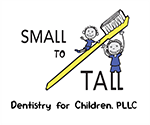Care Of The Mouth After Local Anesthesia
If the dental procedure was in the upper jaw, the area close to the tooth worked on will be numb. Children are not usually bothered by this feeling and may eat and drink normally after the procedure. Dental work in the lower jaw requires the tongue, teeth and lip to be numb. Children find this feeling more difficult to handle after the procedure is over. A nice cold popsicle after a dental procedure can distract the child and prevent self-injury to the numb area.
Children of all ages have been known to chew, scratch, suck, or play with the numb lip, tongue, or cheek. These actions can cause minor irritations, or they can be severe enough to cause swelling and ulceration of the tissue. If this occurs the swelling of the lip or cheek can be quite alarming. Place your child on a soft diet for several days until the swelling goes down. Give “Tylenol” or “Motrin” for pain control and to assist in bringing down the swelling. A swab of warm salt water can be used to cleanse the abraded area. Older children can rinse with a warm salt water mouthrinse until the swelling has gone down. Children rarely need antibiotics to treat the injured area.
Monitor your child closely for approximately two hours following the appointment. It is often wise to keep your child on a liquid or soft diet until the anesthetic has worn off.
Pain & Swelling:
It is normal to experience some degree of swelling on the side which received the dental work. This is simply a response to the stretching of the cheeks and lips which was necessary to reach the teeth to be worked on.
If your child feels discomfort after the anesthetic has worn off, it is recommended that you give them “Motrin”, “Advil” or “Tylenol”. Follow the directions on the bottle for your childs’ weight and age. If the pain persists, please contact the office.
